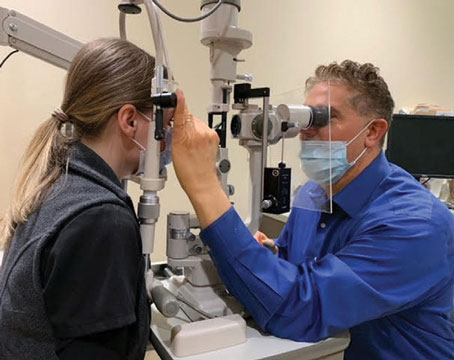All good things must come to an end, but sometimes you can delay that ending for a while. That's what many of the ophthalmologists on our National Panel are planning to do with their retirement. Whether it's from a love for their profession or financial pressure to keep a steady paycheck coming in, a good number of them say they're going to keep working past age 65. They also have opinions on the best financial instruments to use to save for retirement and the ways they're going to pass along the ownership of their practices when they finally decide to hang up the "Gone Fishing" sign.
For this month's National Panel report on retirement issues, 80 physicians, or 11 percent of our 750-doctor sample, responded. See how your opinions jibe, or conflict, with theirs.
Putting It Off
Most of our panelists (52 percent) say they're going to delay retirement for a few years, and will retire between the ages of 66 and 70+, with 31 percent actually declaring the latter age point. Thirty-five percent say they plan to retire before age 65, and 12 percent plan to retire exactly at age 65.
 |
The group who plans to defer retirement cites several different reasons for its intentions.
Michael Solomon, DO, of Warren, Mich., says he will have to retire somewhere between the ages of 66 and 70 due to "ongoing increased overhead, rapidly decreasing reimbursements, college tuitions and less value from retirement portfolios."
A surgeon from Florida says he'll probably have to wait until after 70 to retire because he "was never able to accumulate the needed funds in the pension plan."
A California surgeon says there are two reasons for his waiting until 70+ years to retire: "One, there are financial reasons. Two, I just have no desire to quit."
The lack of sufficient funds in retirement accounts was a recurring theme. "I need to build up my retirement assets," says a physician from Washington. A Pennsylvania surgeon concurs, saying, "Reimbursement hasn't permitted me to have a sufficient nest egg."
Some surgeons, though, say they aren't strapped for retirement cash—they just like practicing ophthalmology. "I still enjoy my work," says a panelist from Arizona. "My health is good and I enjoy my lifestyle." "Ophthalmology is too much fun," agrees Santa Maria, Calif., surgeon Dennis Shepard.
 |
"I enjoy helping my patients see better," says Boonlua Ratanawongsa, MD, of Olean, N.Y., who plans to keep working past 70.
On the other side of the coin are the 45 percent that say they consider early retirement (before age 65) as an option. Though the late-retiring doctors feel strongly about not giving up a career that fulfills them, these early retirement advocates feel just as strongly about the need to get out of the game.
"I want to see my family more," says a physician from Alabama. A surgeon from Iowa says he wants to retire early because he's "financially able and wants to enjoy other pursuits."
"I'm leaving because I have many other interests besides ophthalmology," says a surgeon from Washington, D.C.
Rather than running to something, though, a fair number of surgeons are just running away from ophthalmology. An Ohio surgeon says he's ready for early retirement because of "managed- care issues, the Health Insurance Portability and Accountability Act, administrative hassles and malpractice insurance costs."
"Practice management has become too burdensome," says a physician from California. A panelist from Nebraska feels similarly, saying that he's considering early retirement due to the "frustrations of dealing with the administrative end of the practice." John Nolen, MD, of Marietta, Ga., is ready to retire immediately because of the twin pressures of "Medicare and malpractice insurance."
 |
Most surgeons, though, say they intend to keep a hand in patient care even after they retire. Sixty-five percent say their retirement will involve working part time in ophthalmology and 16 percent say they will work part time in another field. Only 19 percent say their retirement will be completely work-free.
"My retirement plan is simple," says a doctor from Florida. "I do not play cards, golf, tennis, et cetera, and I still enjoy ophthalmology, so I define retirement as the ability to limit my practice as I desire. I no longer do procedures that present a risk—no lid surgeries or children. Also, I limit my practice hours to 10 a.m. to 4 p.m. three days a week, and 10 a.m. to 12 p.m. on Friday. And, I do rewarding activities, such as exams in a cerebral palsy center, whenever I can."
Where's the Money Coming From?
Ophthalmologists are using a mix of practice- and self-sponsored savings plans to prepare for their retirement. Interestingly, probably because of the volatility of stocks, of the practice-sponsored plans, physicians say they like a pension plan the best, followed by a 401(k) and their own personal, non-tax deferred investments.
Forty-eight percent of the physicians have a profit-sharing plan, 28 percent have a 401(k), and a quarter have a pension plan. A surgeon from Alabama says he prefers a pension plan because of the "tax deferment." Adds a California panelist, "A defined benefit pension plan allows the biggest contributions." When it comes to planning for retirement, "You can count on a pension plan," agrees another Californian.
 |
For self-sponsored plans, 72 percent of the respondents use a traditional Individual Retirement Account, 66 percent invest in stocks, 55 percent use mutual funds and 38 percent invest in other non-tax-deferred investments such as bonds (more than one answer was possible).
Another surgeon from California thinks investing his own money is the best way to save for his retirement. "The government has made the tax- benefited plans too costly or too limited," he asserts. "Personal investments have the potential for the greatest financial benefit (gain)," agrees a physician from New York. A surgeon from Ohio, however, isn't impressed with any of the plans, whether personal or practice-based. "The economy is bad, so they all suffer," he says.
How Much and for How Long?
To fund their practice-sponsored retirement plan, the biggest single group (27 percent) of surgeons contributes $20,000 to $29,000 per year. A quarter of the respondents say they contribute more than $40,000 annually.
As far as how long surgeons have been saving, the most common pattern is 11-20 years, followed by 37 percent of them. The second-most common was a period of 21-30 years. "I contributed heavily in the golden years of ophthalmology 10 years ago," says a physician from Phoenix. "I've contributed little or nothing in the last 10 years."
 |
The responding ophthalmologists are mixed, however, on the subject of whether they feel they can hit the retirement savings targets they've set for themselves. The lackluster economy is the number-one reason for their doubt. "I don't think $2.1 million to $3 million dollars is still an attainable goal," says an ophthalmologist from Ohio. "Investments as a whole have been performing poorly in this economy."
"My goal may not be attainable," says a California physician, who wanted to have at least $2 million dollars put away by the time he left his practice. "I've been unable to adequately fund my retirement until just recently."
Michigan's Dr. Solomon also thinks his goal may be tough to reach. "My goal may be difficult secondary to market conditions and our post-bubble economy," he says. "Bottom line: with our new world order, it is difficult to make predictions for 20-25 years from now."
A surgeon from Washington, D.C., also has a pessimistic view. "My goal of saving more than $5 million isn't an attainable one," he says. "The stock market is bad and there's a cap on the amount of contributions you can make to pension plans."
"The markets have been too volatile," agrees a Floridian. "The 2000 tech bubble burst, and there has been malfeasance in the markets." A physician from Illinois blames his inability to reach his goal on "stock-market felons."
Some surgeons, though, think they'll be able to hit their retirement targets in time.
A surgeon from Illinois thinks that the markets can yield fruit if you're willing to tough out the lean years. "Conservative investing pays off in the long run," he says. "You don't have a lot of unexpected large losses." A physician from Pennsylvania feels the same way. "Yes, my goal is attainable. By setting conservative goals for returns, I've remained on target even with the drop in the market."
 |
A surgeon from Alabama says his goal is reachable because of his "brilliant investing," while another surgeon subscribes to the philosophy that two earners are better than one: "My goal's attainable—I married an orthopedic surgeon."
To live the lifestyle they'd like, 47 percent of the panelists say they'll need a post-retirement investment income of $100,000 to $150,000 per year. A quarter say they'll need between $150,000 and $250,000.
Tying Up Loose Ends
Since the ophthalmologists' staffs rely on them, when they retire they most likely won't just embark on a permanent vacation. Instead, the panelists say they have plans on how to pass on their practice to another when they're ready to go.
Twenty-nine percent say they've got a pre-arranged practice buy-out plan in place that will allow the existing partners to buy out the retiring ophthalmologist's share of the practice. Twenty-six percent, however, say that, as solo ophthalmologists, they will hire an MD associate and then gradually transition the practice over to him or her as they enter into partial retirement. Another 23 percent are solo practitioners who say they intend to sell their practice immediately and then retire, with no transition period in between.
An ophthalmologist from Illinois however, didn't have a good experience in his transition to retirement. "I had a group practice, but one of the junior partners decided it was time for me to retire," he recalls. "The partner forced the issue by doing things like stealing patients from me, holding secret meetings and influencing ODs to refer patients to him."
Though this physician sees the validity in the various practice exit strategies, he sees another, less rosy one: "More likely, you'll close the doors and leave seven fine employees without jobs and thousands of loyal patients with no help," he says.
Though there are no doubt other disheartening retirement stories out there, we can hope that most ophthalmologists will ease into retirement like one doctor from Florida. Says he, "Since, fortunately, I am in good health, 'retirement' is doing the work I enjoy just enough to keep me occupied while allowing me time for other interests, such as raising bromeliads and driving my antique Packard."
Thanks to Joseph Gallagher, an attorney and retirement specialist with The Health Care Group in Plymouth Meeting, Pennsylvania, for helping design the retirement questionnaire.







